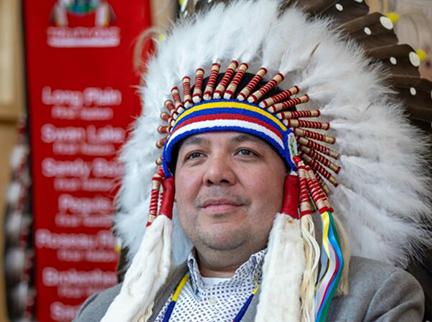rewrite this content and keep HTML tags
Treaty One Nations are still waiting for a response from the Manitoba government and Winnipeg city council about why impacted First Nations were not notified when wastewater from the city leaked into the Red River on two separate occasions.
Treaty One Nations Chairperson Gordon BlueSky, chief of Brokenhead Ojibway Nation, says he only found out last week when the news reported that more than 135 million litres of untreated sewage had spilled into the Red River since Feb. 7. It was also at that time that he found out there had been an initial wastewater spill in November 2023.
“What’s their notification process? Because I never received anything and I’m potentially the most impacted community seeing that the water literally goes by my First Nation and in my backyard. So again, I don’t know why there is no process established, but it’s a bit shocking,” said BlueSky.
While the Red River doesn’t go through the Brokenhead Ojibway reserve, BlueSky says his community fishes on the southside of Lake Winnipeg where the Red River enters the lake.
“Lake Winnipeg is already in a bad shape,” he said. “It’s being killed as we speak. This is just killing it more.”
On the day he found out about the February leak, BlueSky says he had a telephone call from provincial Environment and Climate Change Minister Tracy Schmidt on a different matter. He says he told her about the leakage, of which she seemed unaware.
Schmidt had phoned, says BlueSky, to make him aware that the province was giving the nod to the Canadian Premium Sands project in his territory while turning down the Sio Silica project. Both companies are Alberta-based and both are sand-mining projects. Schmidt said Manitobans had raised concerns about potential risk to groundwater from the Sio Silica project.
“This water quality issue came forward and that sewage leak came forward, and I’m like, ‘Whoa. What’s this? This doesn’t make a lot of sense’,” he said.
He points to his communication with Schmidt as an example of the province “notifying us about everything” especially if they want access to First Nations lands.
“But yet this (leakage), this is allowed to happen? I don’t get it. It’s like the worst-case scenario, really, isn’t it?” said BlueSky.
On Feb. 16, Treaty One Nations issued a media release directing the city and province, in part, to “engage in meaningful consultation with Indigenous communities on planning and decision-making processes related to environmental management and infrastructure development in their traditional territories.”
“What I’m saying when it comes to regulations, there needs to not only be the regulating of wastewater, but there also needs to be somebody holding these municipalities and provinces to account,” said BlueSky. “Right now there’s no enforcement of any sort. There’s no compliance measures.”
BlueSky would like to the see federal regulations put in place.
Treaty One Nations have also called for immediate repair work to stop the leak; a full investigation into the cause of the incident; an immediate prioritization of funding to modernize and improve wastewater infrastructure; and a commitment to “transparent reporting and accountability measures regarding environmental incidents and steps required to address them.”
According to news reports, the two leakages occurred due to problems with pipes that were installed in 1970.
BlueSky says there is only one explanation for the lack of response from either level of government. He says it’s clear that First Nations and their concerns don’t matter.
“Our water doesn’t matter. Our fishermen’s livelihoods don’t matter. Even the kid and their dad out there catching fish, a tradition that’s been going on for at least since the beginning of Canada and also beyond that, for thousands of years, doesn’t matter. Our livelihoods, our rights, our right to fish and our rights to have clean water flowing through our lands, it doesn’t matter,” he said.
BlueSky says they are considering legal options, but still pursuing discussions.
“We’re calling upon all levels of government to have a conversation. Our land and our water has spirit, just like a living being that we need to protect. And obviously in these particular cases they can’t speak for themselves and we have to be the ones that do that,” said BlueSky.
“And we’re just tired of the progress of others, the prosperity of others (that) has to sacrifice some of the most sacred things that we have as people. They say water is life, and I truly do believe that.”
Windspeaker.com requested comments from Schmidt and the city of Winnipeg but did not hear back from either by deadline.
Read the full article here


